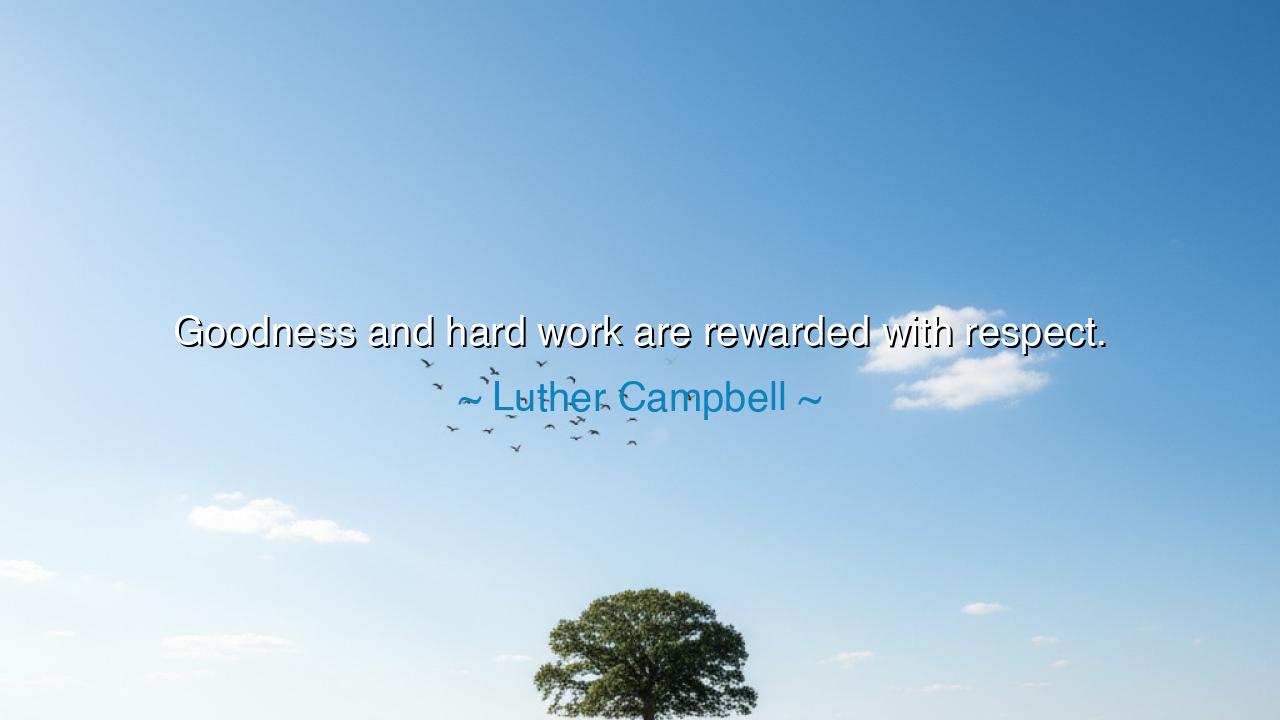
Goodness and hard work are rewarded with respect.






In the realms of human endeavor, there exists a principle as ancient as time itself: the idea that goodness and hard work are not only virtues in their own right, but also the seeds that yield the precious fruit of respect. Luther Campbell, in his words, succinctly captures this eternal truth: "Goodness and hard work are rewarded with respect." It is a simple yet profound notion, one that calls us to examine the way we live our lives and how our actions, grounded in integrity and perseverance, shape the way we are perceived by others.
From the earliest teachings of the great philosophers, we know that the highest form of living is not one of indulgence or ease, but of virtuous action. Aristotle, in his Nicomachean Ethics, taught that virtue is the essence of the good life, a life that is lived in accordance with reason and with a sense of moral purpose. It is through the cultivation of goodness—through honesty, justice, courage, and kindness—that a person not only enriches their own soul but also earns the respect of those around them. In this sense, Luther Campbell's quote becomes a modern echo of this ancient wisdom: to be good and to work diligently toward one's goals is to earn respect in the eyes of others.
Consider the ancient warrior who labors on the battlefield, not for glory or fame, but to protect and honor the values of their community. Take, for instance, the story of Hector from The Iliad, who, though faced with certain death at the hands of Achilles, stands firm for the honor of his family and people. His commitment to the values of courage and honor, and his tireless efforts in battle, earned him the respect of both his comrades and his enemies. Though his life was short, Hector’s legacy endures as a symbol of the reward that comes to those who live with integrity and labor in pursuit of a noble cause. In the same vein, Luther Campbell's words remind us that, though the journey may be long and arduous, it is the steadfast commitment to doing good and working hard that brings us the respect that transcends mere admiration.
But it is not only in the deeds of ancient heroes that we see the truth of this principle; it can also be observed in the lives of everyday individuals. The story of Nelson Mandela, whose tireless fight for justice and freedom cost him twenty-seven years of imprisonment, serves as a testament to this very principle. His goodness, reflected in his commitment to equality and his perseverance through unimaginable hardship, earned him the respect of not only his nation but the entire world. His life teaches us that respect is not something that can be demanded or bought, but something that is earned through hard work, sacrifice, and an unwavering dedication to what is right.
From these examples, the lesson is clear: respect is not given lightly. It is not bestowed upon those who seek only personal gain or self-interest, but upon those who, through their actions, demonstrate selflessness and commitment to the greater good. Hard work, often a silent, uncelebrated force, is the foundation upon which respect is built. Whether in the grand arena of battle or in the quiet, everyday actions of an individual striving to improve their world, respect follows those who labor with integrity and heart.
Yet, the principle also calls us to look inward. Goodness and hard work are not just external qualities; they must also be cultivated within. The work we do, and the goodness with which we approach it, reflect the depth of our character. Luther Campbell's words remind us that true respect is earned not only through our visible actions but through the consistency of our intentions. It is not enough to work hard when the world is watching; one must work diligently in every moment, even when no one is looking, and act with integrity in every thought and action.
Therefore, the lesson we must carry forward from this wisdom is twofold. First, we must strive to embody goodness and dedicate ourselves to hard work, regardless of the immediate rewards or recognition. By doing so, we will naturally earn the respect of those around us. Second, we must recognize that respect is not a fleeting acknowledgment, but a deep and enduring reward that speaks to the true value of a person's character. To gain this respect, we must commit ourselves daily to the pursuit of goodness and the labor of our hearts.
In the end, it is clear: the path to respect is not one of convenience or shortcut, but one of perseverance, character, and steadfast dedication to what is right. Luther Campbell's words remind us that this respect, hard-earned through goodness and effort, is the truest and most lasting reward we can achieve in this life. Let us take this wisdom to heart, and with it, cultivate a life of purposeful action, for in doing so, we will find that the respect we seek is not only given, but is ours to command.






AAdministratorAdministrator
Welcome, honored guests. Please leave a comment, we will respond soon